Before I begin reviewing this drama…
I must say that there’s too much to process that I’m at a loss where to start. Take this moment for instance —







 source: kang-mi-rae’s tumblr
source: kang-mi-rae’s tumblr
On one hand, I know this scene didn’t likely happen. A handmaiden having the audacity to scold the future king? No way, Jose.
On the other hand, what’s MORE unlikely to happen is that a young woman in the mid-1700s would understand what sexual harassment is and give it a name.
Don’t get me wrong now. I applaud a heroine like DeokIm. I think she absolutely nailed the description of the creep Chief Hong…errr… Master Hong. He cons his gullible fangirls in the court to believe that he’s a Good Boy with his smile, his suave ways, and his good looks yet he ordered DeokIm put to death without scruples. (hmmm…where have I heard of this before? lol)
But while DeokIm showed admirable guts to call Chief Hong a harasser, this kind of awareness strikes me as an anachronism. It’s as jarring to me as Sally Hemings, the concubine of Thomas Jefferson in the late 1700s, complaining of sexual harassment. Even if she could, she wouldn’t.
This is just one example of my cognitive dissonance with this show. I’m glad that the female lead is depicted as strong-willed and independent, clever and quick-witted, like in this scene:
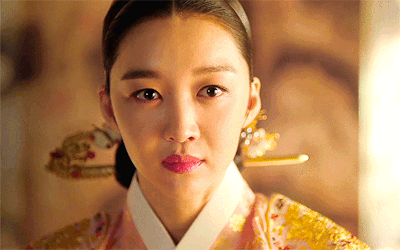
But at the same time, I think the writer is doing a disservice by glossing over the restrictions and servitude of this historical figure, and by feeding this illusion that a woman of her status would have been allowed such considerable latitude during that time.
To me, the love story in this drama is romanticism at its purest. It’s hard not to be drawn in by Lee Junho’s acting, the cinematography, the mood, the setting, the poetry-reading session. But it is highly romanticized nonetheless.
This kdrama doesn’t pretend to be cinéma vérité, but I wish it toned down its impassioned moments a notch…or at least, space them out once every half hour so I’m not continually assailed by emotional fireworks.
I need time to savor the words and the gestures before another dramatic scene is thrust upon me.
I need time to discern what the writer’s trying to tell me, and why he/she is patently insistent that I fall in love with the characters.
Most importantly, I need time to think deeply and carefully whether all these romantic moments could persuade me — had I been in DeokIm’s shoes — to eventually settle to become a concubine, the other woman, the mistress.
That’s the key argument of this drama, isn’t it?
Take away all the palace intrigues and shenanigans, and the main point of the story is the price of being a concubine. It was fine for DeokIm because she existed in that period in time. But as liberated women of the 21st century in a monogamous society, why does it seem acceptable, even desirable, for many of us, to be relegated and consigned to the role of a secondary wife? Are we getting carried away by le grand amour with this Crown Prince? Are we compromising our strongly-held beliefs on autonomy, marriage, fidelity, and freedom, because this story is so romantic? Is monogamy a social construct?
And did we understand the full import when he declared that matters of the state come first with him? He told his mother, “I have no intention of keeping a woman of humble status beside me. Only a daughter of a dignified family would qualify to be by my side. Only such a woman can produce a rightful heir, and producing such an heir is my only intention. I have known nothing but the comforts of life as the Crown Prince. But as I ate rare foods and wore expensive clothes of silk, I grew a sense of responsibility. That I shall dedicate my life to the good of the Joseon Dynasty. And put its interests above those of my private life.”
These are good points to ponder to start with.

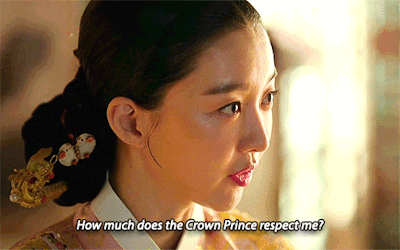
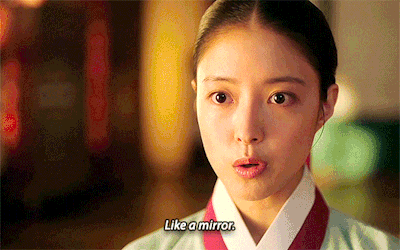
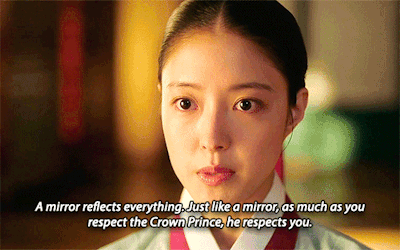
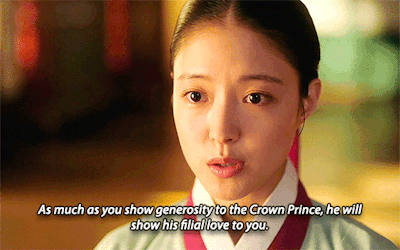
Thanks @pkml3!
@packmule3, Yes, monogamy is a social construct. Marriage, for the most part, has historically been grounded in economics and class. Concubines, sister wives, mistresses have all been part and parcel of the societies in which they existed. Matchmakers have been in business for time immemorial. And there has always been the love that knows no name, homosexuality. What hits me about this drama is that the woman who is the most worthy, our heroine with the modern sensibility, will not hold primacy for the crown prince. And she knows it-she knows her place, no matter how galling that may be. I am deeply into this drama but hate to see the almost never-ending abuse and humiliation Deokim has to go through in order to just survive(I have not counted how many times she’s been threatened with death). Her position as a palace maid was probably enviable for her time, where those living outside were probably faced with destitution and starvation. That’s something Deokim is well aware.
Although I find the Crown Prince outwardly dreamy, I hate his cruel streak-e.g., the never-ending letter of apology, how he endangers Deokim by even meeting and speaking with her in places like the library. She can easily be dispatched in an instance by her very presence with him. We do see him punished by various forms of isolation, and he is subject to assassination attempts, but he has fewer constraints than any of the servants. Yeah, his “love” for Deokim is actually selfish and cruel.
My hope for Deokim is that she eventually finds agency or as much as she can and a modicum of peace. The prince’s love should be a limited bonus for a life on her own terms (that to me is probably impossible).
At random, even in contemporary K Dramas, we still see the illegitimate children of the chaebol classes(current royalty?) and the existence if mistresses. Infidelity is not uncommon. It just seems to be the modern manifestation of the ginseng. It is fascinating to think about comparing the historic to the modern versions.
Thanks for sparking these thoughts @packmule3.
Good points, @OldAmericanLady.
Yes, I like dramas that make us think beyond the literal. And this drama has a lot for me to process.
As I said, I find dissonance. There’s a “but” somewhere.
For example, he is dreamy (like you said) but… it’ll never be the selfless love for her. It can’t be. So how dreamy is that?
She has an independent streak but…she’s just a lowly palace maid. If she has to bow and scrape, and kiss-ass, is that truly independence?
She protests the harassment from Master Hong but… the Crown Prince was harassing her too when he made her rewrite those apology letters as an EGO TRIP. 😂
He seems to be a single man but… in history, wasn’t he already married when he met DeokIm? 🤔
The story seems romantic but… is it really?
@pm3 thanks for giving me vocabulary about what sometimes I feel with some of the historical dramas “anachronism.” Yeay learn something new every day. I understand your pause because I do that sometimes with dramas. Now I have a name for it.
As @GB mentioned monogamy is a social construct. Quick fact the Pueblo Indians in the US were some of the few ancient societies that practiced monogamy unrelated to Judeo/Christian influence. Also, in ancient societies most commoners were likely to practice monogamy and the elite class practiced polygamy.
I agree the Crown prince is mean and DI doesn’t seem to catch a break. I’m hoping to learn what the show gives for her deciding to be a concubine. I mean a “realistic” historically appropiate reason for it (long shot). I mean yeah he’s hot but why put it off for 10 years. I know I’m getting my reality and drama confused. I can’t help it. Wish I could read the book.
What’s their take? Why did it take 10 years and 2 months before she gave birth?
If they don’t show that then it’s your run of the mill “grand amour” lol and I’m ok with that too.
I’m not a huge fan of historical dramas. There often seems to be a conflict between the royal marriages, which are so often for political, financial or convenience, and the love relationships with concubines. It gets repetitious, imo. In the dramas I’ve watched the royal arranged marriages rarely evolved into loving relationships. In history, marriages like Victoria and Albert’s are rare. I agree with @OAL that in royal circles at least, monogamy was a social construct.
At least in k-dramas the concubines were acknowledged. This often wasn’t the case in the West. However universally, the concubines and children of the concubines rarely became as powerful as the legitimate wives and children unless circumstances make them the best choices for a dynasty. At least this is how it seems to me. Similarly, in the West, William the Conqueror/the Bastard was an anomaly. This question today makes me reflect on the British Royal Family in the 20th century, when Charles had to marry an aristocratic virgin. That saga is still being played out.
As to Deok Im, one of the court ladies said that she should serve the prince precisely because she is bold and intelligent. He doesn’t like the other court ladies because he can cow them. I think that she does show too much 21st century assertiveness – that is a plot problem – but her boldness was what first attracted her to the prince. He was fair to not punish her for it early on because he didn’t reveal his identity at the time. His repetition of the apology letters was certainly childish and petty. (It’s sort of amazing that he is even as thoughtful as he is, given the repeated punishments from his grandfather meant to prevent him from becoming like his father. It made me wonder if he worries about going mad.) Later he noticed also that Deok Im reacts to him in his first identity of the tutor/scholar as if out of habit, so perhaps he is becoming reluctantly accepting of her attitude. I have a feeling that we are being shown that he is learning from her even as he learns from his books.
oh my I’m so sorry @AOL for getting you confused!!!! my apologies, didn’t mean to do that. I just noticed I called you the wrong name.
Hi @carolina, No harm done. Frankly it is an honor to be confused with @GB, one of my favorite posters. This lost goes to show howconsiderate BODS are.
LOL @Carolina no worries, I make that mistake too from time to time. Must be a sign of how ubiquitous I am that my handle popped into your mind! LOL.
My Dear @OAL, thank you for considering me one of your fave posters 😄 😍 I am honoured!! I appreciate reading your perspectives that often widen my horizons.
Speaking of anachronisms, I wanted to check that at least the costume/props were right for the times, and it’s true that eye glasses/spectacles were already in use in late Joseon.
https://www.koreatimes.co.kr/www/culture/2021/11/362_146292.html?fa
“During the close of the Joseon Kingdom (1392-1910) era, glasses were often viewed as a symbol of rank and prestige rather than a tool to enable the elderly to see. …”
“It isn’t clear when glasses were first introduced into Korea. It was probably during the 16th century through China but there are some who believe that Korea manufactured some glasses. They were far from easily obtained and were quite expensive but prized for allowing the elderly to regain some of the vision of their youth.”
“Of course, there were rules on the proper etiquette of when to wear glasses. Similar to smoking tobacco, one did not wear glasses in front of one’s elders and superiors. To do so in front of the monarch was even worse.” …
“But monarchs were also governed by etiquette. King Jeongjo (r. 1776-1800), who may have been the first Joseon monarch to wear glasses, was faced with the dilemma of choosing whether to wear his glasses in front of his council or forego them and basically be unable to read the documents before him. He apparently chose to wear them.”
I looked up what might have been the forbears of spectacles.
https://www.shine.cn/feature/art-culture/1909061557/#:~:text=However%2C%20the%20precursors%20of%20spectacles,son%20of%20Emperor%20Liu%20Xiu.
“The first eyeglasses are believed to have been made in the Italian city of Pisa in about 1290. However, the precursors of spectacles can be traced back to the Eastern Han Dynasty (AD 25-220) in China.”
“…history can be broadly divided into five phases. The first period spans from the time immemorial to the Western Han Dynasty (206 BC-AD 25). During that time, Mozi, a Chinese philosopher of the Hundred Schools of Thought period, postulated that light travels in a straight line. His study of geometrical optics laid the foundation for eyeglasses.
“The second phase spanned from the Eastern Han Dynasty to the Northern Song Dynasty (960-1127), when glasses were just single lenses used to magnify images,” said Liu.
In the third phase, starting from the Southern Song Dynasty (1127-1279), eyeglasses as we know them today began to take shape. They were composed of two eyepieces connected by a bridge that went over the nose, but they weren’t fastened to the ear.
“Users either held the frames or used string to fasten them to the head,” said Liu. “Glasses were expensive in ancient times, so they were exclusive to the aristocracy. A pair of glasses could be exchanged for a horse at that time.””
— new bit of learning for the day 😉 —
Thank you @pm3 for your perspective of this drama. You aren’t the first person I read about the FL talking about sexual harassment. Wonder if the Korean word of it is somewhat more nuanced and different.
I am torn between what I imagine to have happened in history based on what I have read and what the drama presents. How much should a drama follow history as per history books? How much would you expect a historical fiction to follow the recorded history. After all a lot details is in the imagination of the writer.
Crown prince was betrothed to his queen at a young age, I read somewhere at around the age of 12yo. There is no hint of his queen at this point of the drama.
Also it is written that King Jeongjo was a deeply Confucian monarch. This is the confucian view of marriage:
“From the point of view of Confucian philosophy, one of the purposes of marriage is the cultivation of virtue. The Chinese have seen that marriage (Chinese: 婚姻; pinyin: hūn yīn) should be founded on love since the concept of monogamy is rooted in their mindset.”
However the responsibility of a king is to produce an heir to take over him, and this probably is a conflict in interest in terms of marriage and rules of royalty. None of the real Deokim’s children survived, and his only surviving son wasn’t able to continue his legacy as well as he would have hoped, I suppose.
Hi @Grace, Thank you for the Korean and Confucian views on marriage as these relate to this particular drama. The fact that we’re dealing with royalty with all its constraints complicates any attempt at actually following these precepts. And the actual history of this king is tragic.
I used to be a devotee of BBC historical dramas. One that I liked in particular was The Dutchess of Duke Street that was loosely based on the life of Rosa Lewis, a commoner who became a cook and hotelier, who was a mistress to the future King Edward VII. The show character, Louisa was assisted by high born men, but made her fortune and fame by her own hard work and that gained the admiration of the men who helped her. The time period for this show was the late nineteenth century to the early twentieth century Britain when women were still greatly oppressed. I include this because our drama and this program show the universality of women’s experiences across cultures and eras. The fact that our heroine actually existed provides our contemporary writer with a jumping off point to explore how one woman may have gained agency to use for good. The writer, director and actors do a wonderful job in showing how difficult life was for most women. The high born had to use their wits to hold their positions even though they were not subject to the rigors of physical labor. I also think that depending upon who their parents and husband’s were, they may have been subject to physical and emotional abuse. However, if you were low born, you could expect the abuse and never ending, back breaking work. It appears that our court ladies and maids were at least, decently clothed and did not go hungry. Our heroine is so much more remarkable because she reads, understands difficult concepts and writes with excellent penmanship. I was also taken with the fact that she identified the map that showed where the elusive tiger could be found. I am not hoping for a happy ending but I am rooting for Deokim to find agency and to live a good life without the prince. Goodness knows, she deserves it.
@Grace,
🙂
I’m not literature major so I don’t know much about the literary conventions for historical fiction. However, speaking simply out of common sense, I would assume that any viewer – just like any reader – of historical fiction/historical drama would expect two things:
One, accuracy.
Two, authenticity.
Sure, the storyteller has the creative license to weave his story in “his own way.”
For instance, he can totally alter or revamp history, so the plot diverges from the history book. This is how most stories about parallel universes or alternate world operate, right?
Or the screenwriter can use with the framework of history, and then get creative with the unrecorded or behind-the-scenes moments by injecting a “what-if” scenarios. Think of “Forrest Gump” for instance. The timeline is accurate: there was the Vietnam war, and Forrest Gump was drafted, and he met Lt Dan. He was attending university in Alabama when the desegregation of school began. He played table tennis in China during Nixon’s Ping-pong Diplomacy. And so on.
Most kdramas are like this. “Lovers of the Red Sky” for example. History was the framework, and the supernatural activities were used to explain the historical events.
Or the screenwriter can do a time-travel. Case in point, “Mr Queen.” The 21st century male lead had an accident, and he woke up in the Joseon period in the body of the Queen. The comedy arises from the male lead’s 21st behavior and language (not to mention his male perspective) when dealing with the Joseon King.
Or the writer can have a truly improbable plot in a historical setting…like that adaptation of Jane Austen with vampires in “Pride and Prejudice and Zombies.”
There are lots of ways that the writer can be creative without wrecking authenticity and accuracy.
Now, the issue I raised with this drama “Red Sleeve” is that the writer has written a historical character who’s acting as if she’s a 21st century girl who’s been transported back to the mid-1700s. As I said, I like that DeokIm’s an independent and all. But in many ways, this same streak of independence makes her inauthentic to me. Her character doesn’t sound plausible.
I guess the simplest analogy I can give is Pride and Prejudice. Just imagine Elizabeth Bennet’s parlor maid running around the grounds of Windsor Castle like a hoyden, then meeting the Prince of Wales, falling in love with him, and scolding him for allowing his Latin tutor to harass her. I can tell you that I would have zero problems fantasizing about a love story between the parlor maid and the Prince of Wales. I’m a sucker for romance, as you know.
But I can’t picture her comporting, acting, or speaking as if there’s no social conventions (or social inequality) constricting them. It simply strains credulity. It also forces a 21st century standard practice on the social mores and customs of another era. And it sugarcoats the situation of women during that time. THAT’s what I mean by authenticity. I don’t mind if a historical fiction writer flubs the historical accuracy here and there because I understand it’s hard to fit everything perfectly together like pieces of a puzzle. But at the very least, the story must strive to be authentic.
Thank you @pm3 for calling my attention to this. In the heat of the moment during the bath, since the prince was lashing out at her, I figured DI might say that the scholar was harassing her–although that choice of words, upon examination, does seem surprisingly modern. I wondered if maybe the Viki translators had used that verb when the word in Korean might have seemed less modern?
The thing that jarred me prior to this scene was when DI and the Prince were talking outside the palace and she praised him effusively. He said, “Wait, are you sucking up to me?” That seems such a modern phrase, out of place in the Joseon era. But I wonder, again, if part of the problem is with the translation? Are the translators making it relatable to a 21st century audience–or was it like that in the script?
I’ve enjoyed many things about this drama–the quiet moments of romance, like when DI read the odes to the prince through the door. But as we get further into the episodes, I have a growing discomfort knowing what has to come, given the history and their circumstances. After all that yearning comes the time to couple–it is the satisfying end we all look for in a k-drama, even a sageuk. But how satisfying is it to see a woman become a mistress/concubine and not an equal partner? A concubine can be a confident for a king, but isn’t she also always going to serve the main function of being his sex on the side?
Thank you @pm3 for your reply. That was really helpful. It is true that her character is unusually independent and her talk back to the prince seems to put her on an unusual master-servant relationship for that time and era.
I think they addressed it in this scene where Yisan was surprised as to how DeokIm dares to speak to him in a manner unlike most court ladies, and he deduced that from her accidentaly calling him the Gyeomsaseo, that she still saw him as the gyeomsaseo and the barriers seem to be blurred between them.
There were more than one incident that built our acceptance of that r/s: from her chasing him out of the library incident, her turning his reprimand of her into a praise when she was caught following him and other incidents I might have forgotten now. I think what the writer was trying to do was building that blurring of master/servant line between the both of them.
I think prior to that, before she knew that he was the crown prince, when she crossed his path, she was way more polite and reserved, in front of him at least.
In some records, someone said that it is unusual for DeokIm to reject or refuse the prince’s confession because it would mean death for her. However, it seemed like they had a very close relationship and the prince wrote in her epitaph that “He understood her heart and didn’t rush her again.”
So I am willing to look past that for now to enjoy the show as it starts to get complicated.
Nice reminder! I was fully immersed by the intense acting and the poem reading. It’s time to pop the bubble and have a sensible look at this.
If I am with the moral standard this day and time, then it is not very romantic at all. @pm3 You rightly point out, it is the other woman. The mistress. It normally causes a lot of family issues, creating jealousy and often not a peaceful and loving environment for children to grow up with.
However back in the time, often the Queen is never the true love but a strategic alliance. The moral standard got blurred. The hope for a lonely fatherless prince to find someone who understands his pain. A clever girl who tried not to be the pawn and find her own way to love and protect the prince. Forbidden love, poem reading delivered by pretty good acting can make this drama addictive. Admittedly, DI’s boldness is unlikely to happen however it gives me the feel good that she can stand up for herself in those difficult situations. So, my thinking not to forget from time to time, this is fiction.
Hi @Viva, More than the prince, it’s DI’s story. She must survive as a not well born woman in an age where women were routinely mistreated, raped, died in childbirth, went hungry, and in general suffered indignities. I love that she is able to read and write and that she has intellectual curiosity. The Viki description seems to say that she did not want to be a concubine/mistress but I think in this drama she rethought her initial choice. I am waiting to see how this plays out. My take here is that although this drama has a modern sensibility, the characters are not assured a happy life. I am preparing myself to cry a lot because I don’t see a happy ending. Nevertheless I am hooked because our two leads and the supporting actors are doing such a great job. And, @packmule3, I see your points but am purposely suspending disbelief.
I also have to say this, 2021 has been a great year for K Dramas from great noir, thrillers, fantasy, historical, romance, etc. And I’m not talking about The Squid Game phenomenon.
Hey @OAL yes. there are a few things I like about DI:
1. She doesn’t go for looks. She probably doesn’t think San is that good looking but she likes San because he was brave. He wanted to save more people by killing the tiger right away. Even though she found the right hand man Hong appealing, she wasn’t swooned by him.
2. She is a quick thinker and brave. She can add value for San’s sticky situations. It started from the young she comforted San, she helped San to escape from grandmother’s place. Then brave enough to ask favour for the King to forgive San. She persuaded the Queen to help releasing San from confinement.
3. She reads the book San gave her (the poem etc), even though that is not her first choice of books. She gave it a go because San wanted her too. It feels like she does it for San.
4. She sympathises with San and listens to San. When San got hit by the King during confinement, She asked questions, tried to understand why he put up with it. Once she understood he put up with it for the greater good for the nation, she pledged loyalty.
5. She refuses to be a pawn and rejected chief court lady.
The San side that I like:
1. Despite threatening DI in ep 8, he is willing to let her go if that means saving her life.
2. He protects her and stood up for her, even though she is “merely” a court lady.
3. Multiple times he saved her. Yes it is a bit staged but allow me to be shallow lol.
4. He is never that shy to express his adoration for DI.
I guess we are going through with their emotions with them as they find their ways. He knows politically how to choose a Queen, but his heart says otherwise. Likewise, she knows politically it is hard to be with the prince and trying to find her own way to protect the prince. Happy ending unlikely so I too prepare to cry!
@Viva, So beautifully said. We’ll cry together.
I’ve been meaning to comment on this post but I’m just plain busy nowadays but I totally understand you and yes, my love story needs to be secure, binded and sealed forever as in just two people who will have their happily ever after, not one where there’s a few more ladies involved. 🙁
When I watched the first couple of episodes, I didn’t think that DI will live that long without being punish by the CP. I mean she was really bold, I was taken aback actually. I mean if CP were not that sort of CP then maybe she’d died already after the first throwing of salt. LOL.
I’m enjoying this so much and I will just take it as a love story, a love story that’s different in that they didn’t really have a happy ending. I will still enjoy DI and Crown Prince Sana’s journey.